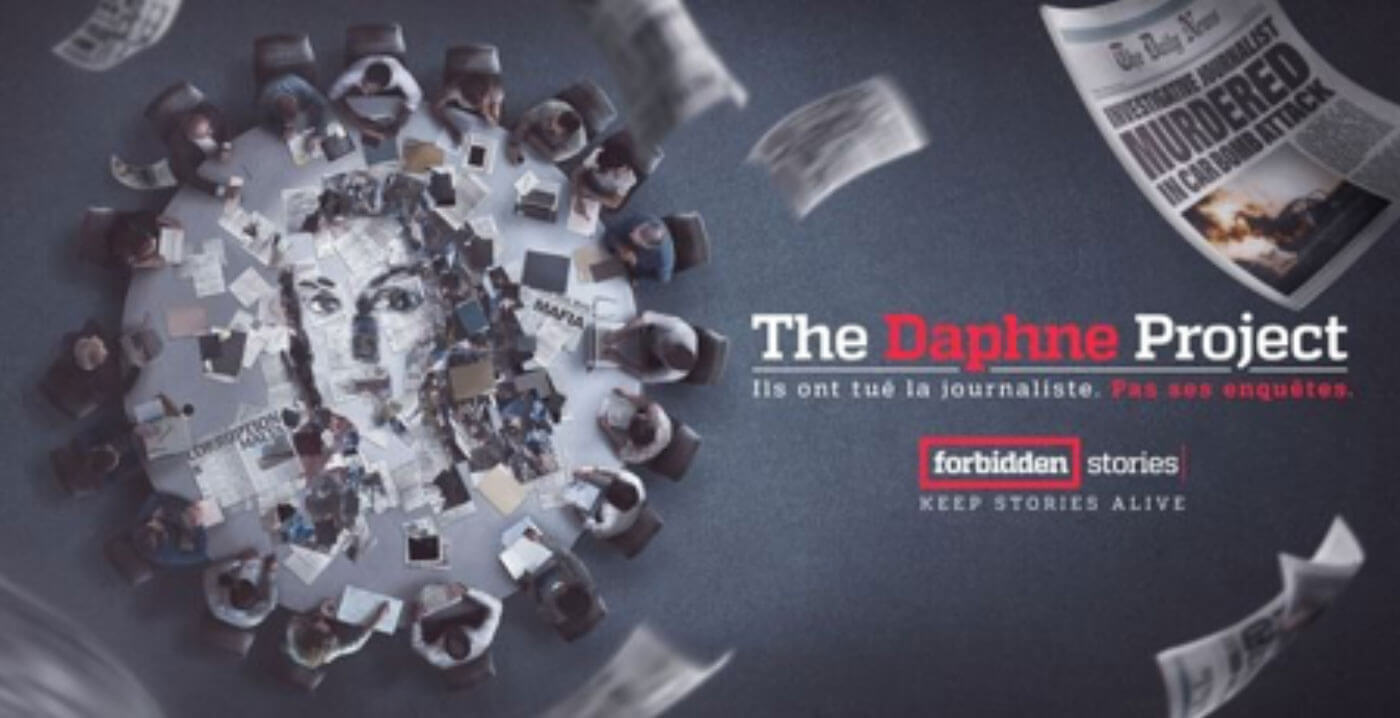Forbidden Stories launched ‘The Daphne Project’ on 17 April 2018. This means Jules and 44 other investigative journalists, many with experience at the Organized Crime and Corruption Reporting Project, have been studiously scanning through the leads reputable Maltese investigative journalist Daphne Caruana Galizia was working on before she was killed.
Firstly, the Project will continue Daphne’s final investigations. Secondly, it will uncover possible suspects behind her murder.
Collaborative journalism is nothing new. Recently, major investigative collaborations have revealed the Panama and Paradise Papers, creating shockwaves throughout the entire industry that Daphne herself had been basing some of her investigations on.
Yet, collaborative journalism is assuming an increasingly important role in the reporting industry. As democracy is dwindling in certain pockets of the world, so is press freedom. Collaborative journalism is the response to the growing global assault on free press.
‘Two journalists have been killed in the European Union this year. This cannot be possible any more – that is our message,’ Jules explained. ‘There will now be a network of journalists devoted to continuing their work. It sets a precedent for future journalists who may face similar situations to Daphne. You are not alone.’
Daphne Caruana Galizia was renowned for thoroughly investigating high-level corruption involving Maltese politicians. This notoriety came at a cost however.
‘At the end, Daphne was relentlessly harassed. Her house was set on fire. Her dogs were killed. People were making her life hell.’ said Jules.
Her most recent investigations revealed vast amounts of corruption within Malta’s “passports for cash” program, which allows citizens of one country to purchase legal residency or full citizenship in Malta.
On 16th October 2017, Daphne was murdered by a car-bomb. Despite the arrests of 3 men in December 2017, it is fast becoming evident that the Maltese government cannot investigate her murder impartially.
Corinne Vella described the increasingly hostile environment her sister, Daphne, found herself traversing as an independent, outspoken journalist.
‘Over the last 5 years, there was a sharp increase in the number of libel suits against Daphne. It seemed to be a coordinated attack. Cases were brought individually by ministers and their associates, but they were all linked to the government. One minister had her bank account frozen. She died without access to it. The cases were all matters that could have been settled directly by using the right to reply under the Press Act. They have no interest in clearing their name – they can’t, because what she reported is true – it is just a case of grabbing the headlines and using the media to discredit her.’
‘In the case of Daphne’s murder, her isolation was key. Mainstream media would ignore her reports or report “Daphne Caruana Galizia said…” – this helped to create a climate in which Daphne’s work was treated with suspicion.
‘Eight months later, people in and out of government still see her as a threat even though she’s dead.’
When asked about the importance of the Daphne Project, Corinne Vella said,
‘On a personal level, I’m pleased they named it the Daphne Project. It reminds people that my sister existed. It reminds people of the importance of journalism.
‘I feel like what Daphne wrote about is being vindicated. It is as much about remembering her as it is about preserving, continuing, and building on her work itself.’

Through the Daphne Project, collaborative journalism is realising its full potential – in its important ability to carry out reporting on behalf of those journalists working in countries with limited press freedom.
Take Malta, for example. The archipelago, situated between southern Europe and North Africa, has dropped the most places on Reporters Without Borders’ Press Freedom index for 2018 out of any country listed. Six NGOS, including PEN International and Reporters Without Borders, submitted a joint report to the United Nations on the freedom of expression in Malta. This report highlighted the lack of media pluralism, the danger journalists face, and the legislative limitations on freedom of expression in Malta. Despite the murder of Daphne, journalists are still being targeted.
Sarah Clarke, International Advocacy and Policy Manager for PEN International, explained why Malta is fast becoming a morass for independent and critical journalists.
‘In the last four years, Malta has experienced a profound deterioration in the situation of free expression and access to information in the country, culminating in the brutal assassination of Daphne Caruana Galizia, and the impunity which has followed her murder.’
‘We are extremely concerned about the situation of the rule of law in the country in relation to securing justice in this case. We believe the assault on free speech, and ultimately her assassination, was designed to terrorise any other journalist who would attempt to report on the extremely sensitive corruption issues she was exposing.’
Manuel Delia is one of those “other journalists” Sarah Clarke hypothetically described. His experience of operating as an outspoken journalist in Malta is a reflection of the situation Daphne faced. He explained:
‘There are real threats to independent journalism in Malta. State and party-controlled media dominate most people’s source of information which pushes independent journalism into a fringe perceived as extremist and lacking credibility.’
Manuel operates a blog, similar to the one Daphne started in 2008. And he has been ‘condemned’ by the prime minister, like Daphne had. He continued,
‘Yes, I experience harassment. I am frequently heckled when going about my business in the street, even with my children, and my car has been targeted by vandals several times.
‘My website has been attacked twice with Distributed Denial of Service attacks of a scale rarely seen in Malta, causing downtime but, more importantly, resulting in increased operational costs.
‘I am also the subject of a libel lawsuit by a Labour Party official which I consider frivolous and merely intended for its nuisance value. That lawsuit is still ongoing.’
Whether financially, emotionally, physically, or legally harassing journalists, the Maltese government punishes free speech that is critical. The death of Daphne has revealed a brutal reality.
The Committee to Protect Journalists have recorded the deaths of 821 journalists in the past 26 years. Of those 821 journalists, 341 covered crime or corruption. In 86% of murder cases, the killers were not prosecuted.
Enjoying impunity, the murderers of investigative journalists are not deterred to repeat their crime. Yet, going forward, collaborative projects can ensure that investigative journalists, and their stories, do not become victims of violence or censorship in countries where press freedom is under attack.
Sarah Clarke believes that consortium projects dilute the risks of investigative journalism.
‘The Daphne Project, like the Panama Papers, are exceptional new forms of effective collaborative journalism which are creating a sea-change in how investigations are run transnationally. By spreading the risk from the focus on one journalist, these networks are effectively protecting individual journalists from the threats, harassment and violence which journalists like Daphne faced alone. They also send a powerful signal that even if you kill a journalist, their investigations will not die with them. We need far more of these types of collaborations, especially in countries with even greater risks for journalists – Turkey and Mexico for example.’
Jules Giraudat from Forbidden Stories clarified the importance of collaborative journalism in relation to the Daphne Project.
‘This is a new collaborative cross-border project. It’s a good sign for the profession – the behaviours of journalists are changing to be safer. Editors are starting to understand it’s very important to collaborate. The Panama and Paradise papers have set that precedent.
‘When Daphne died, it made us think that we should have intervened earlier. If we had, it doesn’t mean she wouldn’t have been killed, but perhaps she would’ve felt less alone.’

By Jordan Bate

